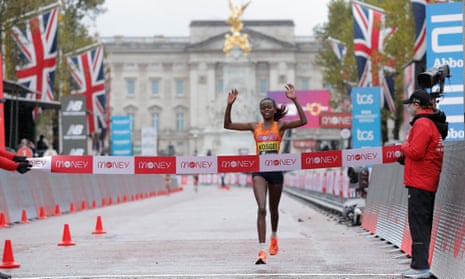The London Marathon could leave the BBC for the first time in its 40-year history after the event director, Hugh Brasher, revealed he was in talks with other broadcasters.
The race on Sunday is the last covered by the contract which was signed in 2018. And while Brasher stressed the event would remain on terrestrial TV, he said organisers were now exploring other opportunities.
“This is one of the crown jewels of British sport,” Brasher said. “That’s the FA Cup, there’s the Grand National, the Boat Race, Wimbledon tennis, and the London Marathon. All the other events have been around for over 150 years but the London Marathon is 40 years.
“It’s incredible what we’ve become in that time, and we do not take that in any way lightly. It is fair to say we are talking to other terrestrial broadcasters. It is likely an announcement will be made this year.”
While the BBC remains the favourite to keep the rights, the news that the London Marathon could disappear will raise further concerns about the corporation’s sports coverage. In recent years the broadcaster has lost the rights to show live coverage of the Open and the Masters, while its coverage of the Tokyo Olympics was less comprehensive than in previous Games after it sub-licensed its rights from Discovery.
More recently the BBC was also outbid by Channel 4 for the rights to share live coverage of Emma Raducanu’s US Open final victory with Amazon Prime. And while Brasher praised the BBC’s commitment to the race, and the fact its coverage of the 2020 event was nominated for a Bafta, he also hinted they would have to bring more to the table.
“We have had a 40-year partnership with the BBC. And we have been absolutely delighted with that partnership. But we will explore all sorts of other opportunities.
“We believe that this event lives on terrestrial TV. This event is for Britain. This event is for the world. It has a global reach. It is the world’s most popular marathon, over 457,000 people applied for the 2020 event, and showcasing it to as many people as possible to make it inspire as many different communities as possible, is what we need to do.
“And that is what we’re talking to broadcasters about, and about the future.”
Brasher predicted Mo Farah would return to the race after sustaining a stress fracture this year. “We look forward to him having a speedy recovery. And when he is back we will be having conversations with him. Do I think he can break the current European marathon record? Sure.”
